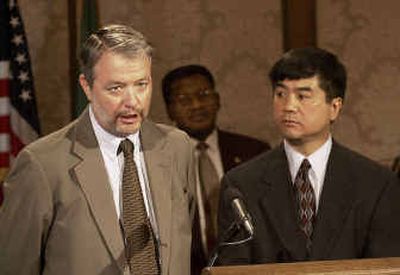DSHS chief offers parting advice

OLYMPIA – Washington state won’t solve the problem of child abuse until it reduces the number of poor, single women having unplanned pregnancies, Department of Social and Health Services chief Dennis Braddock told The Associated Press in a wide-ranging interview.
Braddock, 61, will retire today after four years, eight months and 15 days in charge of the state’s largest agency. He is the longest-serving DSHS secretary in state history.
On the eve of his retirement, Braddock reflected on preventing child abuse, the need for national health care, and running an agency that frequently doubles as a punching bag.
With an $8 billion budget and 18,000 employees, DSHS oversees the foster care system, Medicaid, alcohol and drug treatment programs, services for the disabled, food stamps and other social programs.
Braddock’s job is a hot seat, mostly because DSHS is where government intersects with families in crisis. Usually, the stories end happily, but when they don’t the consequences can be tragic.
Most recently, 4-year-old Sirita Sotelo was beaten to death in January after state caseworkers removed her from foster care and returned her to her birth father’s home. No charges have been filed. Her case followed the grim pattern of 2-year-old Rafael Gomez, who died after caseworkers returned him to his birth parents in 2003, and 3-year-old Zy’Nyia Nobles, who was beaten to death after a caseworker sent her back to her mother in 2000.
There is no magic solution for preventing deaths in the child welfare system, Braddock said.
“It’s a risky business,” he said. “If you look across the country, not one state in the country has resolved this issue.”
The long-term solution, Braddock said, is family planning. He points to statistics showing that more than 50 percent of births in Washington state are unintended, 30 percent of kids are in single parent homes, and 43 percent of births are paid for by Medicaid. Most children of poor, single parents do just fine, Braddock said, but they are at higher risk for abuse and neglect.
“Low-income, unintended pregnancies — that’s the problem,” Braddock said.
If he could, Braddock said, he would require women on social service programs such as food stamps or Medicaid to agree not to get pregnant.
“They are not in a good position to have more kids,” Braddock said.
That would be illegal, though. So Braddock pursued a more realistic solution — integrating services such as food stamps and child welfare, so struggling and stressed-out parents can get help before they reach the breaking point. Braddock counts service integration as one of his great successes at DSHS.
Most of what the DSHS director does is basic management rather than hot policy issues, Braddock said: information technology, civil service rules, payroll systems.
“Those are the things that are really very important, but they’re pretty boring,” Braddock said.
Braddock has overseen substantial changes in Medicaid, the joint state and federal health care program for disabled adults and poor families. Washington state got permission from the federal government to charge premiums for some Medicaid services — the state hasn’t yet, but might in the future. Health care costs are the fastest-growing part of the state budget.
States aren’t going to solve the health care problem, Braddock said.
“It really requires a national policy. Every other country does this with a lot less money than we do,” he said.
Using Medicaid as a catchall for people who lack health insurance is “immoral,” Braddock said, because it requires people to spend themselves into poverty before they can get help.
Handling controversy is part of the job description for DSHS secretary. Braddock pointed to a recent newspaper article about DSHS revoking the license of a Seattle adult family home after a woman died there. Some people criticized DSHS for overreacting; others criticized the agency for not going far enough.
“It was just a classic,” Braddock said. “We deal with these very human, difficult issues that put us in the middle of families in crisis.”
Braddock said he’s confident his successor, Robin Williams-Armstrong, former director of the Utah Department of Human Services, will provide experienced leadership.
“She’s been through this same sort of criticism,” Braddock said.
On the dry-erase board that dominates one wall of his office, Braddock has written a long list of looming issues. They range from the sweeping civil-service reforms taking effect next summer, to a new payroll computer system, to issues such as mental health funding.
In one corner a message is scrawled: “Revenons a nos moutons.”
Braddock loosely translates the French saying as “Watch after the sheep” — wise advice for the next shepherd to fill his shoes.